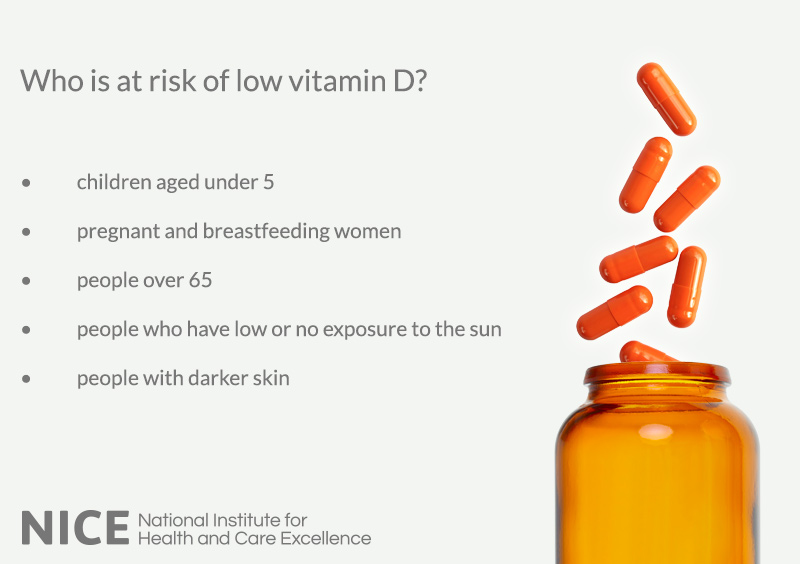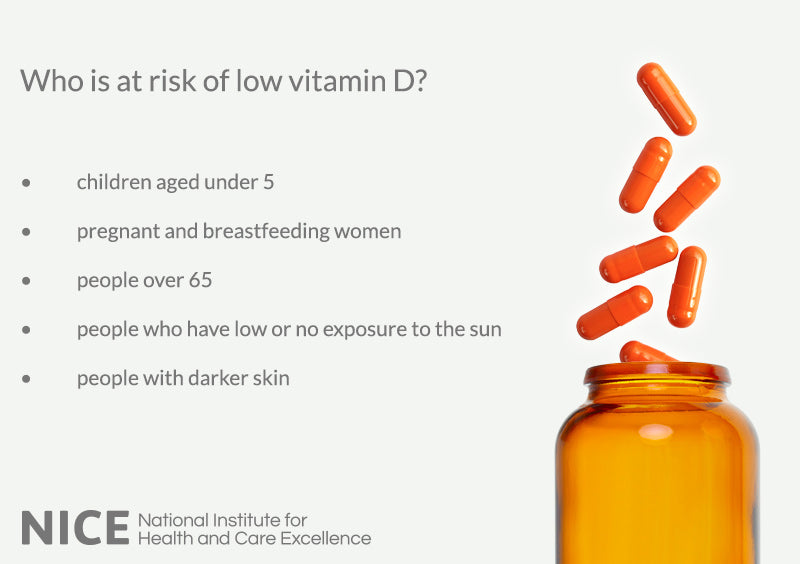The main natural source of vitamin D is through the action of sunlight on the skin, but in the UK from mid-October to the start of April, sunlight doesn’t have the correct wavelength to create vitamin D in the skin. Many people are not aware that the sources of vitamin D available from food are limited. This means that people who are at risk of low vitamin D status may need dietary supplements.
Across the whole population of England, it’s estimated that 1 in 5 adults, and around 1 in 6 children, may already have low vitamin D, which is around 10 million people. Vitamin D is essential for strong bones, because it helps the body use calcium from the diet. Vitamin D deficiency has been associated with rickets, a disease in which the bone tissue doesn't properly mineralize, leading to soft bones and skeletal deformities. Vitamin D may also protect against osteoporosis, high blood pressure, cancer, and other diseases.

People who have darker skin because their bodies are not able to make as much vitamin D. For example, people of African, African–Caribbean and South Asian origin.
The thyroid gland is a butterfly-shaped gland in the front of your neck. It makes hormones that control the way your body uses energy. Hypothyroidism or underactive thyroid means your thyroid gland doesn't produce enough thyroid hormones.
In the UK, it affects 15 in every 1,000 women and 1 in 1,000 men.
Symptoms
Symptoms of bone pain, muscle weakness, tiredness and general aches and pains can mean you have a vitamin D deficiency. Some people may not have any symptoms at all. If you are high risk group or think you may have vitamin D deficiency, you should see your physician, or have a blood test to check your levels.
Low vitamin D status is defined by the Department of Health as a plasma concentration of 25 hydroxyvitamin D (the main circulating form of the vitamin) of below 25 nmol/litre (equal to 10 ng/ml). The recommended daily intake of vitamin D for at risk groups is 10 micrograms/day.
Based on NICE press release in Nov 2013
More resources:
Patient.info: Vitamin D is important for good health, growth and strong bones. A lack of vitamin D is very common. Vitamin D is mostly made in the skin by exposure to sunlight. Most foods contain very little vitamin D naturally, though some are fortified (enriched) with added vitamin D. Click here to read more
Healthline: Most people with a vitamin D deficiency won’t be aware of it. It doesn’t usually produce noticeable symptoms. However, symptoms are possible. If you are vitamin D deficient, you may experience: muscle/joint pain and weakness, bone pain, tiredness or fatigue, depression. Examine your risk factors and then check with your doctor. A simple blood test can help you figure out your next steps..... Click here to read more
Vitamin D council: For a number of reasons, many people aren’t getting enough vitamin D to stay healthy. This is called vitamin D deficiency. You may not get enough vitamin D if......., click here to read more.....
Jen reviews: Hypovitaminosis D is the decline of vitamin D in the system due to old age. Elderly with a lack of vitamin D in their systems are at a higher risk of developing dementia or having a stroke. As of now, five studies have reported a link between hypovitaminosis D and dementia.

